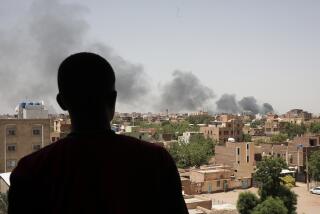PERSPECTIVE ON LIBERIA : A Cry From Our Distant Cousins : Certain death faces the 50,000 members of one tribe remaining in Liberia. America has an obligation to step in.
- Share via
Hundreds of thousands of terrified and starving Liberians have poured into the Ivory Coast, Sierra Leone and Guinea to escape slaughter. Last week I was in the Ivory Coast, listening to accounts of whole families killed in their sleep, villages torched, people executed by the late President Samuel Doe’s army or by opposition factions that are also fighting each other.
For most of his decade in power, Doe deliberately inflamed ethnic tensions. The United States, which looked the other way, now has a moral obligation to aid the victims of this disaster.
The current crisis has its roots in a rebel insurgency launched last December, when Charles Taylor’s small band of guerrillas from the Mano and Gio tribes attacked government posts in the north. Soldiers of Doe’s Krahn tribe slaughtered Mano and Gio civilians in reprisal. By June, rebel forces had gathered enormous strength, largely in reaction to army atrocities and years of pent-up frustration with Doe’s dictatorship.
In July, out of sight of the few foreigners remaining in the capital city, Taylor’s rebel forces moved through the Krahn stronghold of Grand Gedeh and killed every man, woman and child in their path. Rebel atrocities reached such heights, particularly since the Doe’s assassination Sept. 10, that 75,000 Krahn have fled Liberia. An estimated 50,000 remain, facing certain death. It is not overstating the case to conclude that Taylor’s forces plan genocide against the Krahn.
Liberia, which was settled in the 1800s by freed American slaves, has close political and historical ties with the United States. We can and should do more to help the victims of this brutal power struggle.
European donors consider Liberia an American problem, and the response to United Nations and Red Cross appeals has fallen short. The Bush Administration’s announcement last week of increases in assistance to the refugees is too little and too late. The Liberians I visited in the Ivory Coast were hungry and sick, and their Ivorian hosts, who have shared their meager homes and food, need assistance as well. In one town deep in the jungle, a mother thrust her ailing infant, covered with sores from sleeping on the ground with no blanket, into my arms, as if I could help. All around us, people were without the bare necessities of simple survival. They need blankets, clothes, medicine, soap and above all, food.
The United States also should match the generosity of Liberia’s West African neighbors and permit refugees to enter our country. Currently, it is almost impossible for Liberian refugees in West Africa to enter the United States, even if they have close family ties here. Because of our special relationship with Liberia, the State Department should increase the number of refugee slots for Liberians, as was done two years ago for Soviet Jews. And the Immigration Service should instruct our embassies abroad that applications for nonimmigrant travel visas by Liberian refugees should be favorably reviewed.
The U.S. government should ease the anxiety of Liberians living here, who fear that they will be returned home to face carnage and famine. The INS has announced a six-month program of safe haven for Liberians, but it is limited to those who arrived before late July. Safe haven should be granted to all Liberians here until they can return home without fear of violence.
Finally, our government should make it clear that atrocities against civilians are intolerable. In late September, after meeting separately with the rebel leaders, Assistant Secretary of State Herman Cohen asserted that they support democracy and are willing to negotiate. Since then, Taylor and breakaway rebel leader Prince Johnson have sworn to continue fighting, a goal that promises to destroy what is left of Liberia. Unknown thousands have already died, and those remaining, particularly the Krahn and Mandingo people, are desperately at risk from the Taylor and Johnson forces. It is not too late to help them.
More to Read
Sign up for Essential California
The most important California stories and recommendations in your inbox every morning.
You may occasionally receive promotional content from the Los Angeles Times.













